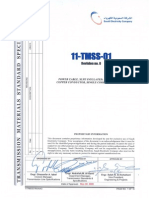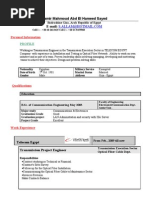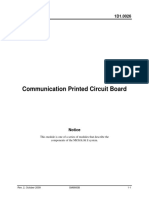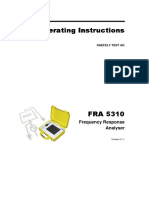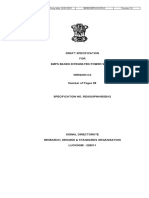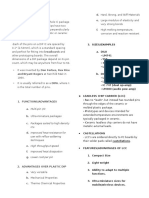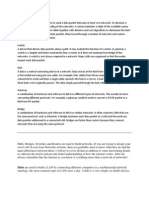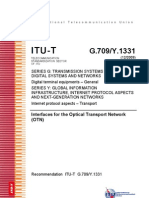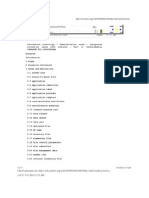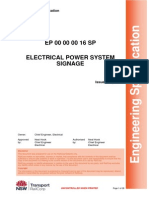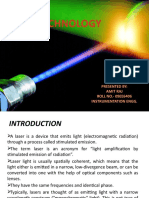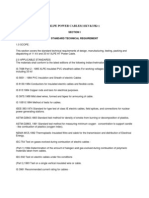100%(1)100% found this document useful (1 vote)
Leaky Coaxial Cable Spec
Leaky Coaxial Cable Spec
Uploaded by
Ashwani KumarThe document specifies requirements for leaky coaxial cable to be used for a train radio system in tunnels. It outlines the following key points:
1. The cable must operate in the 380-450 MHz frequency band and comply with various construction, electrical, and mechanical standards.
2. Construction requirements include specifications for the inner and outer conductors, dielectric, insulation, sheath, and identification markings.
3. Electrical requirements include a characteristic impedance of 50±2 ohms, minimum loss characteristics, and the ability to transmit both horizontally and vertically polarized signals.
4. Mechanical characteristics that must be provided for each cable type include weight, bending radius, tensile strength, crush resistance,
Copyright:
© All Rights Reserved
Available Formats
Download as PDF, TXT or read online from Scribd
Download as pdf or txt
Leaky Coaxial Cable Spec
Leaky Coaxial Cable Spec
Uploaded by
Ashwani Kumar100%(1)100% found this document useful (1 vote)
The document specifies requirements for leaky coaxial cable to be used for a train radio system in tunnels. It outlines the following key points:
1. The cable must operate in the 380-450 MHz frequency band and comply with various construction, electrical, and mechanical standards.
2. Construction requirements include specifications for the inner and outer conductors, dielectric, insulation, sheath, and identification markings.
3. Electrical requirements include a characteristic impedance of 50±2 ohms, minimum loss characteristics, and the ability to transmit both horizontally and vertically polarized signals.
4. Mechanical characteristics that must be provided for each cable type include weight, bending radius, tensile strength, crush resistance,
Copyright
© © All Rights Reserved
Available Formats
PDF, TXT or read online from Scribd
Share this document
Did you find this document useful?
Is this content inappropriate?
The document specifies requirements for leaky coaxial cable to be used for a train radio system in tunnels. It outlines the following key points:
1. The cable must operate in the 380-450 MHz frequency band and comply with various construction, electrical, and mechanical standards.
2. Construction requirements include specifications for the inner and outer conductors, dielectric, insulation, sheath, and identification markings.
3. Electrical requirements include a characteristic impedance of 50±2 ohms, minimum loss characteristics, and the ability to transmit both horizontally and vertically polarized signals.
4. Mechanical characteristics that must be provided for each cable type include weight, bending radius, tensile strength, crush resistance,
Copyright:
© All Rights Reserved
Available Formats
Download as PDF, TXT or read online from Scribd
Download as pdf or txt
100%(1)100% found this document useful (1 vote)
Leaky Coaxial Cable Spec
Leaky Coaxial Cable Spec
Uploaded by
Ashwani KumarThe document specifies requirements for leaky coaxial cable to be used for a train radio system in tunnels. It outlines the following key points:
1. The cable must operate in the 380-450 MHz frequency band and comply with various construction, electrical, and mechanical standards.
2. Construction requirements include specifications for the inner and outer conductors, dielectric, insulation, sheath, and identification markings.
3. Electrical requirements include a characteristic impedance of 50±2 ohms, minimum loss characteristics, and the ability to transmit both horizontally and vertically polarized signals.
4. Mechanical characteristics that must be provided for each cable type include weight, bending radius, tensile strength, crush resistance,
Copyright:
© All Rights Reserved
Available Formats
Download as PDF, TXT or read online from Scribd
Download as pdf or txt
You are on page 1/ 3
Tender CS14: Particular Specification
.Confidential Page 81 of 125
4. LEAKY COAXIAL CABLE
4.1 General
4.1.1 A network of Leaky Coaxial cables shall be installed for train radio system in the
tunnel.
4.1.2 The train radio system shall operate in frequency band 380-450 MHz.
4.1.3 The contractor shall furnish all information as asked for in this specification in
respect of LCX for frequency band 380-450 MHz. In addition to the requirements
specified in section 1 appendix D Chapter 4 of this PS following specifications shall
be complied with by LCX cables.
4.2 Construction Requirements
4.2.1 Conductors
4.2.1.1 The inner conductors shall be of high conductivity annealed copper wire / tube
complying with all the requirements of IEC 60228 and BS 6360.
4.2.1.2 The outer conductors shall be of punched copper tape, or of corrugated copper
tube. The outer conductors which are cut having longitudinal slots so that part of the
energy transmitted through the cable is coupled to the transmission system formed
by the outer conductor of the cable and the external environment and vice versa.
4.2.1.3 Conductors shall be smooth, uniform in quality, free from scales, spills, splits and
any other defects.
4.2.2 Dielectric
The cable dielectric shall be with foamed polyethylene.
4.2.3 Insulation
4.2.3.1 The insulation resistance between inner and outer conductors shall be not less than
20,000 M ohm-km and that between outer conductor and separate moisture barrier
shall be not less than 50 M ohm-km.
4.2.4 Spark Test for Sheath
4.2.4.1 The insulation shall not break down when spark tested in accordance with BS 5099.
4.2.5 Oversheath
4.2.5.1 The oversheath of the cable shall be an extruded layer of anti-corrosion, reduced
flame propagation, low smoke zero halogen compound complying with the fire
performance requirements specified in clause 1 of this Appendix. Single mica barrier
tape under jacketing is required to prevent molten dielectric material from flowing out
of the slots and igniting.
4.3 Electrical Requirements
4.3.1 The characteristic impedance of the cable shall be 50 2 ohms.
Tender CS14: Particular Specification
.Confidential Page 82 of 125
4.3.2 The cable shall have minimum system loss, i.e. minimum of the sum of attenuation
and coupling loss , and maximum useful length.
4.3.3 The cable shall be capable of radiating both horizontally and vertically polarised
signals and shall not produce additional attenuation or coupling loss due to the
presence of oil or moisture.
4.3.4 The tenderer shall furnish the following information with regard to each type of LCX
cable proposed to be used along with locations where they would be used ;
(1) Capacitance
(2) Characteristic impedance
(3) Relative propagation velocity
(4) Coupling loss to a half-wave dipole at 2m distance at 100, 150, 200, 300,
400, 450 Mhz
(5) Longitudinal loss at 100m at 30 , 100 , 150 , 200 , 300 , 400, 450 MHz.
(6) D C resistance inner conductor ( ohms / km)
(7) D C resistance outer conductor ( ohms / km)
(8) D C Breakdown Voltage
(9) Average and maximum power rating ( KW )
(10) VSWR over full frequency bands
(11) Type of inner and outer conductor with construction and dimensions.
(12) Insulation material construction and dimensions.
(13) Sheath construction and dimensions with fire retardant and ani-termite
properties.
(14) Dielectric material / pressurisation specifications
4.3.5 Following graphs of cable characteristics shall be furnished separately for both
frequency bands for each type of LCX;
(1) Linear attenuation Vs frequency
(2) Coupling loss Vs frequency
(3) Coupling loss Vs distance from radiating cable.
4.4 Mechanical characteristics
4.4.1 The tenderer shall furnish the following information with regard to each type of LCX
cable proposed to be used along with locations where they would be used;
(1) Weight (Kg/m )
(2) Minimum bending radius
(3) Messenger wire construction and dimensions
(4) Tensile strength (N)
(5) Bending moment (N.m)
(6) Flat Plate Crush Strength (Kg/m)
Tender CS14: Particular Specification
.Confidential Page 83 of 125
(7) Recommended pulling length (m)
(8) Recommended temperature range during installation (degree C )
4.4.2 Environmental conditions
(1) Operational Temperature 0
o
C to 55
o
C
(2) Relative humidity up to 95% 40
o
C
4.4.3 The Leaky Coaxial Cable shall be manufactured in appropriate lengths to ensure
that there is no joint in the cable between stations.
4.5 Cable Construction Identification
4.5 .1 The oversheath of the cable shall be embossed with the cable type and
manufactures name and length marker
4.6 Testing
Test methods of the cable shall conform to the IEC 61196: Part 4. Test results and
certificates shall be submitted for review by the Employers Representatives.
5 NOT USED
6 NOT USED
7 NOT USED
8 NOT USED
You might also like
- Power system transient analysis : theory and practice using simulation programs (ATP-EMTP) 1st Edition Arai download pdf100% (4)Power system transient analysis : theory and practice using simulation programs (ATP-EMTP) 1st Edition Arai download pdf55 pages
- AN-101D Parking Sensor User Manual-202011-V1.3No ratings yetAN-101D Parking Sensor User Manual-202011-V1.325 pages
- Samir Mahmoud Abd El Hameed Sayed E-Mail:: Profile100% (1)Samir Mahmoud Abd El Hameed Sayed E-Mail:: Profile5 pages
- L1-CHE-PRO-043 v1 - Signalling Arrangement Plans ApprovalsNo ratings yetL1-CHE-PRO-043 v1 - Signalling Arrangement Plans Approvals6 pages
- S10_Color Light- LED and Automatic Signalling_A4_June 2022_1727180541457No ratings yetS10_Color Light- LED and Automatic Signalling_A4_June 2022_172718054145772 pages
- Detailed View of Auxiliary Warning System (AWS)No ratings yetDetailed View of Auxiliary Warning System (AWS)25 pages
- Very Low Power Application Processor Module For Bluetooth® Low Energy v5.0No ratings yetVery Low Power Application Processor Module For Bluetooth® Low Energy v5.031 pages
- As 61010.031-2004 Safety Requirements For Electrical Equipment For Measurement Control and Laboratory Use SafNo ratings yetAs 61010.031-2004 Safety Requirements For Electrical Equipment For Measurement Control and Laboratory Use Saf10 pages
- FRA 5310 - User Manual - Tieng Anh Ver 2.1.1No ratings yetFRA 5310 - User Manual - Tieng Anh Ver 2.1.165 pages
- Ultrasonic Sensors Gloves For Blind People Using Lilypad ArduinoNo ratings yetUltrasonic Sensors Gloves For Blind People Using Lilypad Arduino8 pages
- VVT Education Training Systems Update - 2021V2No ratings yetVVT Education Training Systems Update - 2021V263 pages
- gs1 Epc Gen2v2 Uhf Airinterface - I21 - R - 2018 09 04100% (1)gs1 Epc Gen2v2 Uhf Airinterface - I21 - R - 2018 09 04157 pages
- Servo Nutrunner Z50 - AU50R 1510 - en - R1 PDFNo ratings yetServo Nutrunner Z50 - AU50R 1510 - en - R1 PDF14 pages
- Hubs Are Used To Build A LAN by Connecting Different Computers in A Star/hierarchal NetworkNo ratings yetHubs Are Used To Build A LAN by Connecting Different Computers in A Star/hierarchal Network4 pages
- Test Report: Electromagnetic Compatibility EMCNo ratings yetTest Report: Electromagnetic Compatibility EMC15 pages
- Analysis of Communication Protocols For Smart MeteringNo ratings yetAnalysis of Communication Protocols For Smart Metering9 pages
- Asset Management Plan 2020-2030: Horizon NetworksNo ratings yetAsset Management Plan 2020-2030: Horizon Networks311 pages
- Laser Technology: Presented By: Amit Raj ROLL NO.-09EE6406 Instrumentation EnggNo ratings yetLaser Technology: Presented By: Amit Raj ROLL NO.-09EE6406 Instrumentation Engg32 pages
- 110 - Technical Document of JICA-012 PDFNo ratings yet110 - Technical Document of JICA-012 PDF32 pages
- Dry Type Transformer Spec in Word FormatNo ratings yetDry Type Transformer Spec in Word Format25 pages
- In Building Coverage Solution Aditya Kemang Village 090401 v1No ratings yetIn Building Coverage Solution Aditya Kemang Village 090401 v152 pages
- Stacked Dipole Base Station Antenna: FeaturesNo ratings yetStacked Dipole Base Station Antenna: Features1 page
- Original Data: Angular Distribution of Radiant IntensityNo ratings yetOriginal Data: Angular Distribution of Radiant Intensity13 pages
- Installation Instructions Model CAB-BATT: Battery BoxNo ratings yetInstallation Instructions Model CAB-BATT: Battery Box4 pages
- MD-D04 Installation Manual v00 - 090113 - EnglishNo ratings yetMD-D04 Installation Manual v00 - 090113 - English4 pages
- IEEE STD 32-1972 Requirements, Terminology and Test Procedur PDF100% (2)IEEE STD 32-1972 Requirements, Terminology and Test Procedur PDF36 pages
- An Introduction To ElecNet For Static 2D ModelingNo ratings yetAn Introduction To ElecNet For Static 2D Modeling101 pages
- 03-09 Em-Em-009 (E) Calibration Method For 15 PPM Bilge Alarm MonitorNo ratings yet03-09 Em-Em-009 (E) Calibration Method For 15 PPM Bilge Alarm Monitor2 pages
- Instructions: Loss of Excitation Relay Type Ceh51ANo ratings yetInstructions: Loss of Excitation Relay Type Ceh51A40 pages
- Zero Sequence Circuit of Three-Legged Core Type TransformersNo ratings yetZero Sequence Circuit of Three-Legged Core Type Transformers26 pages
- CLL 361 Instrumentation & Automation: Munawar A. ShaikNo ratings yetCLL 361 Instrumentation & Automation: Munawar A. Shaik28 pages
- ECC-125DA Battery Calculation: Secondary Power Source RequirementsNo ratings yetECC-125DA Battery Calculation: Secondary Power Source Requirements1 page
- What Is The Difference Between CCD and Cmos Image Sensors in A Digital CameraNo ratings yetWhat Is The Difference Between CCD and Cmos Image Sensors in A Digital Camera2 pages




